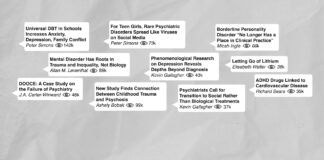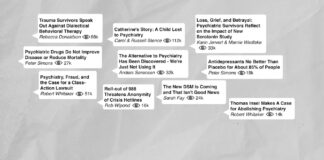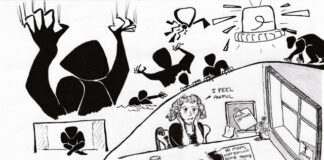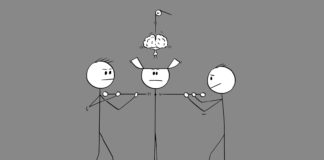Tag: chemical imbalance
Chemically Imbalanced: Joanna Moncrieff on the Making and Unmaking of the...
Joanna Moncrieff joins Robert Whitaker to talk about her latest book, titled Chemically Imbalanced: The Making and Unmaking of the Serotonin Myth. They discuss the serotonin story and the fact that there is no good evidence that a serotonergic deficiency is a primary cause of depression.
New Book by Courageous Psychiatrist about Her Profession’s Most Damaging Falsehood
Writing in CounterPunch, Bruce Levine reviews Joanna Moncrieff's new book Chemically Imbalanced.
Mad in America’s 10 Most Popular Articles in 2023
A roundup of Mad in America's most read blogs and personal stories of 2023 as chosen by our readers.
Leading Psychiatrists Unwittingly Acknowledge Psychiatry Is a Religion, Not a Science
Leading figures in psychiatry acknowledge that DSM psychiatric diagnoses and the chemical imbalance theory of mental illness are not scientifically valid, but are useful fictions that help people manage their emotions and comply with their medication treatments.
Mad in America’s 10 Most Popular Articles in 2022
A roundup of Mad in America's most read blogs and personal stories of 2022 as chosen by our readers.
The Serotonin Zombie: Authors of New Study Try to Breathe New...
Despite new claims that their study provides "clear evidence" linking serotonin and depression, their data actually supports the opposite conclusion: serotonin levels did not correlate with depression.
A Neuroscientist Evaluates the Standard Biological Model of Depression
Current evidence does not support a biological hypothesis of depression. It is far better predicted by levels of childhood trauma, life stress, and lack of social supports.
A New-Old Way of Coping with Grief
"How to Grieve" is a Renaissance recreation of a lost text from ancient Rome by Cicero, and it’s meant for a wide audience. It's packed with talk-therapy strategies for coping with grief.
No Link Between Serotonin and Depression: What Does That Mean for...
Peter Simons covers in detail a new systematic review that debunks the widely popularized myth of low serotonin in depression, the “chemical imbalance theory.”
Response to Criticism of Our Serotonin Paper
Criticisms of the paper were contradictory. Some psychiatrists said that no one ever really believed the serotonin theory. Yet the public does believe it, and are very surprised to learn that it is a myth.
Did Psychiatry Ever Endorse the Chemical Imbalance Theory of Depression?
With the chemical imbalance theory falling out of fashion, researchers examine the claim that psychiatry never truly endorsed it.
What Can We Learn from Alcohol? A Paradigm Shift in How...
The effects of alcohol—both positive and negative—have a lot to teach us about the biomedical view of psychiatric diagnoses and the drugs prescribed to treat them.
How Psychiatry Turned General Difficulties in Adaptation into “Real Illnesses Just...
Though many psychiatrists have abandoned the "chemical imbalance" concept, they now promote the use of a pre-scientific notion that the only criteria for defining disease is the presence of distress or impairment.
Mental Health Survival Kit, Chapter 2: Is Psychiatry Evidence Based? (Part...
“Psychiatry’s Starter Kit”: Many people start their psychiatric "careers" by consulting their family doctor with some problem many of us have from time to time and leave with a prescription for a depression pill.
Mental Health Survival Kit, Chapter 1: This Book Might Save Your...
The term “psychiatric survivor” says it all in just two words. In no other medical specialty do the patients call themselves survivors because they survived despite being exposed to that specialty.
Dr. Pies’ Non-Apology
Dr. Pies' summary of Schroder et al's study is misleading. In fact, the researchers found that the more times a person was hospitalized, the more likely they were to believe the chemical imbalance myth.
Dr. Pies and The Chemical Imbalance Deception
Dr. Pies claims that the "chemical imbalance" theory was never really professed by psychiatrists. Yet he himself wrote an essay in "Creative Nonfiction" in 1999 that purveyed it directly to the layperson.
12 Essential Facts About Psychiatry
With these twelve facts, you are equipped to defend against the misinformation propagated by academic psychiatry, Big Pharma, and the laypeople they target. You are encouraged to use this knowledge to (firmly but respectfully) challenge statements you hear in passing or from loved-ones such as “He is mentally ill,” “I have a chemical imbalance and these drugs help correct it,” or any other commonly accepted falsehoods that the above facts expose.
Allen Frances: Still Spinning the Story
Allen Frances' latest article: There are problems in the psychiatric field, but none of these problems can be blamed on psychiatry. But the spurious promotion of psychiatric "diagnoses" as real illnesses, and the routine prescribing of chemical and electrical "cures" were and are psychiatric inventions.
The Chemical Imbalance Theory of Depression: Where Is It Going?
The spurious chemical imbalance theory of depression is arguably the most destructive thing that psychiatry has ever done. Worldwide, millions of individuals are taking antidepressants, often with a cocktail of other drugs, because they have been told the blatant falsehood that they need the pills to combat a brain illness.
What a Society Designed for Well-Being Looks Like
From YES! Magazine: "To address the dramatic increase in mental and emotional distress in the U.S., we must move beyond a focus on the...
United Nations Statement Criticizes Medicalization of Depression on World Health Day
"There is a need of a shift in investments in mental health, from focusing on 'chemical imbalances' to focusing on 'power imbalances' and inequalities"
What Do Santa Claus and the Chemical Imbalance Have in Common?
Generally, most people, even little people, recognise that Santa is just a game. Children perhaps wholeheartedly believe in the story for a while but flaws in the narrative soon become apparent. Unfortunately, not nearly enough people recognise that the chemical imbalance is also a charade.
The Failed Quest for Biomarkers in Psychiatry
A recent commentary by Ganesan Venkatasubramanian and Matcheri Keshavan notes that efforts to identify biomarkers in people diagnosed with psychiatric disorders have been overwhelmingly...
Who Will Guard the Guardians of Psychiatry?
The assertion that the so-called antidepressants are being over-prescribed implies that there is a correct and appropriate level of prescribing and that depression is a chronic illness (just like diabetes). It has been an integral part of psychiatry's message that although depression might have been triggered by an external event, it is essentially an illness residing within the person's neurochemistry. The issue is not whether people should or shouldn't take pills. The issue is psychiatry pushing these dangerous serotonin-disruptive chemicals on people, under the pretense that they have an illness.

































